
It’s now estimated that 3 children in every classroom have a diagnosable mental health disorder or issue. If a child or young person has an emotional need, it can significantly impact their academic achievements, levels of progress and social interactions with their peers and adults. Early intervention and support are critical if these learners are to feel well-informed and able to talk about and manage their emotional disorder, anxiety or concerns.
Recognising that an anxious or angry pupil will not learn, this course aims to provide educators with the tools and language to help a learner thrive. You will learn about national guidance and the governments push towards mental health and wellbeing provision in schools. You will also learn how to foster a whole school ethos to mental health and explore practical tools and strategies to improve the outcomes for children who need mental health support.
This course responds to the information needs of the whole community centred around supporting the child/young person with mental health needs. You will learn how to assess the needs of a learner with mental health needs and go on to develop a support plan consisting of SMART goals and interventions, which you will implement and later review to determine how well it has met the learner’s specific developmental needs.
The target age range is compulsory education (4-18 years), but the course may benefit those in early years settings too. Parents and carers benefit from raised awareness of their child’s needs. Advisory teachers, therapists and educational psychologists gain access to evidence-based CPD resources that can be used to strengthen capacity in their local authority and schools. Schools can use this course to train individuals or groups of teachers and teaching support staff as part of a school’s improvement plan or a whole-school initiative. NQTs/RQTs also build a secure knowledge of the graduated approach at the start of their career.
We recommend you also watch our SEND Practice Webinar on Supporting Wellbeing and Mental Health in Schools
Our courses are structured into six sections. Click on the section headings to reveal page titles and some example content.
Explore the concepts of wellbeing and mental health, the main influences on these, and the impact on pupil outcomes.
- Section objectives
- Introduction
- The Personal, Social, Health and Economic (PSHE) curriculum
- What do we mean by mental health and wellbeing?
- Influences on mental health and wellbeing
-
Influence of social media
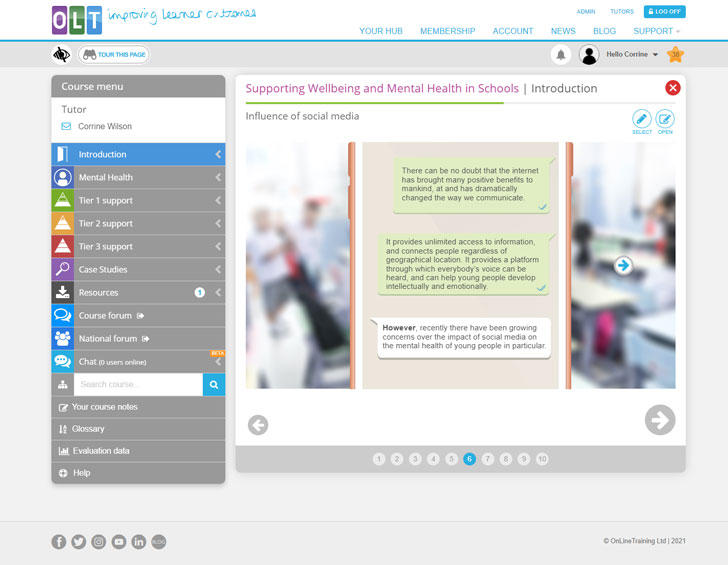
Screenshot from Introduction page 6 - Mental health and wellbeing and academic outcomes
- Models of mental health and wellbeing
- The incidence of mental health difficulties in the UK
- Section summary
Learn about the main types of mental health disorder and their incidence, and the relationship between mental health and disability.
- Section objectives
- Introduction
- Specific disorders
- Other disorders which may be encountered in schools
-
Trauma and mental health
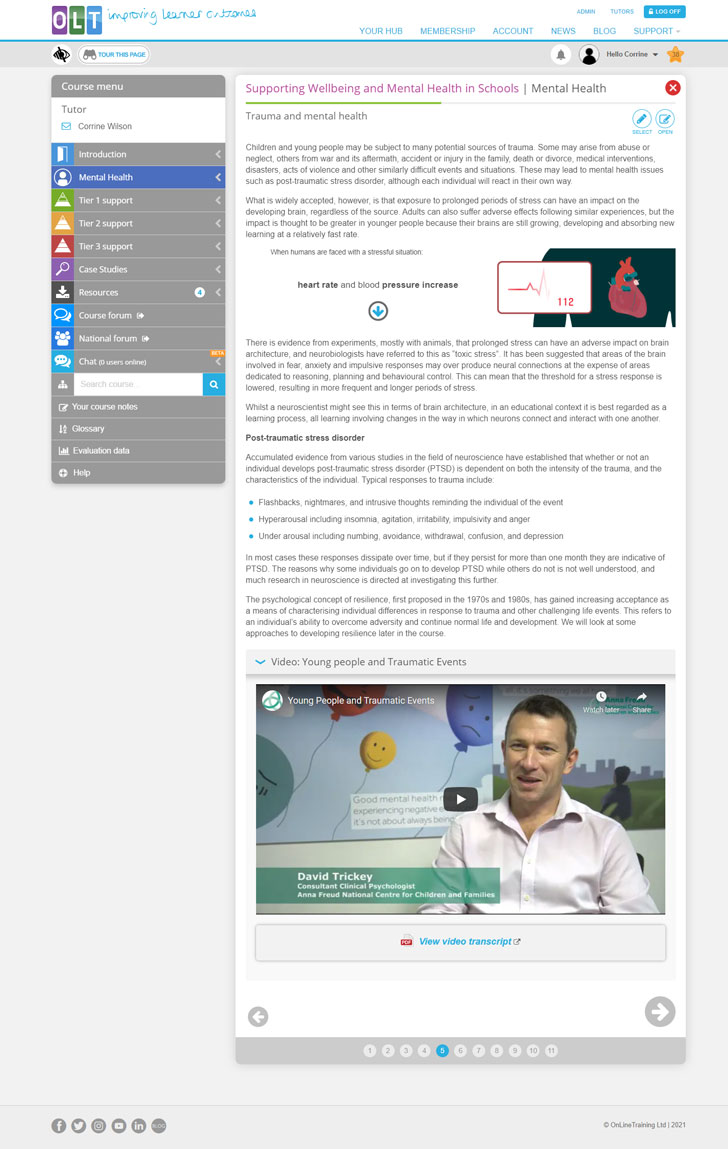
Screenshot from Mental Health page 5 - Self-harm
- Suicide
- The mental health of pupils with a disability
- Staff mental health and wellbeing
- End of section quiz
- Section summary
Explore a range of approaches to assess and support wellbeing and mental health in your school.
- Section objectives
-
A framework for supporting mental health and wellbeing in schools
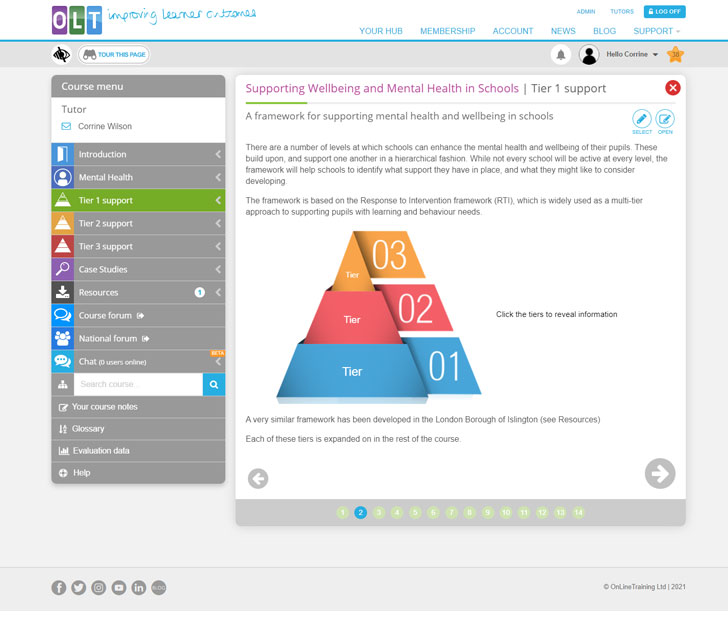
Screenshot from Tier 1 support page 2 - Whole school ethos
- Social and emotional learning (SEL)
- Assessing social and emotional learning
- Some whole school approaches
- Growth mindset
- Strengths-based approaches
- Positive psychology
- Resilience
- Mindfulness
- Trauma informed practice
- Course assignment: Your SMART goal and actions (Tier 1)
- Section summary
Consider the possible uses of wellbeing surveys and questionnaires in schools and learn the guidelines for administering them and evaluating the results.
- Section objectives
-
Being aware
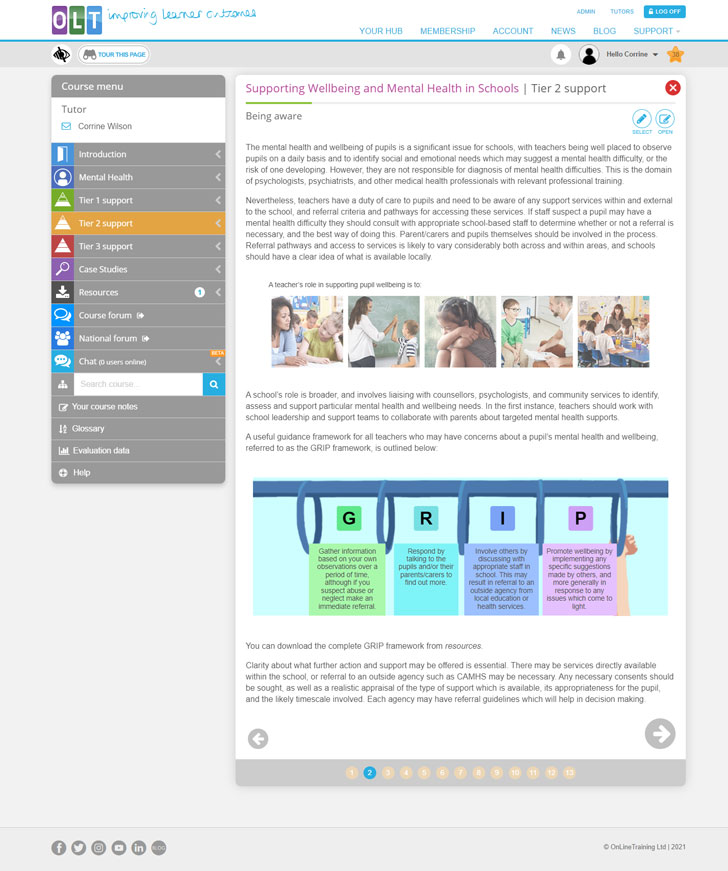
Screenshot from Tier 2 support page 2 - Wellbeing surveys and questionnaires
- Assessment: gain a picture of wellbeing in a particular cohort
- Identifying individuals with mental health issues
- Assessment: identify individuals with mental health issues
- Evaluating the effectiveness of any strategies or interventions
- Assessment: evaluate the effectiveness of strategies or interventions
- Some freely available assessment resources
- Not for profit organisations providing support
- Course assignment: Your SMART goal and actions (Tier 2)
- End of section quiz
- Section summary
Understand the main elements of a supportive school ethos and know when and where to seek further support.
- Section objectives
- Local services
-
The team around the child
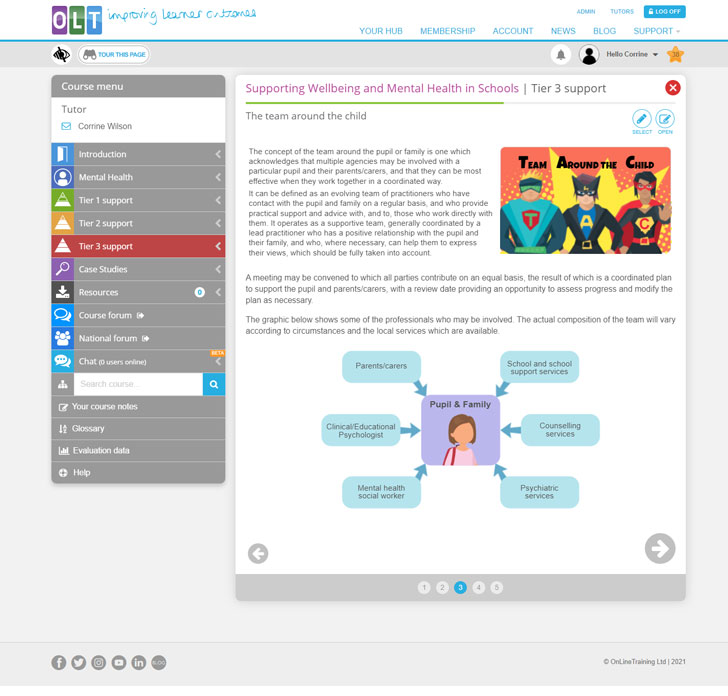
Screenshot from Tier 3 support page 3 - Course assignment: Your SMART goal and actions (Tier 3)
- Section summary
View videos of authentic learners and observe the impact of interventions to help address social, emotional and psychological issues.
- Case study: Mental health - in our own words
- Case study: Tier 3 Interventions and support
- Case study: Using a worry scale
Senior Leader
Teaching Assistant
Teaching Assistant
Teaching Assistant
Teaching Assistant
Teaching Assistant
Teaching Assistant
Course learning outcomes
On successful completion of the course, you will be able to:
- identify the main types of mental health disorder and their potential impact on pupil outcomes
- explain the relationship between mental health and disability
- summarise the place of social and emotional learning in the curriculum
- present the significance of staff mental health and wellbeing
- describe specific approaches and tools that schools can adopt to monitor and support pupil wellbeing
- determine when to seek further information and support from a variety of sources
- develop a conceptual framework for supporting mental health in schools where pupils and teachers can thrive
- create and test your own ‘whole school approach’ action plan

